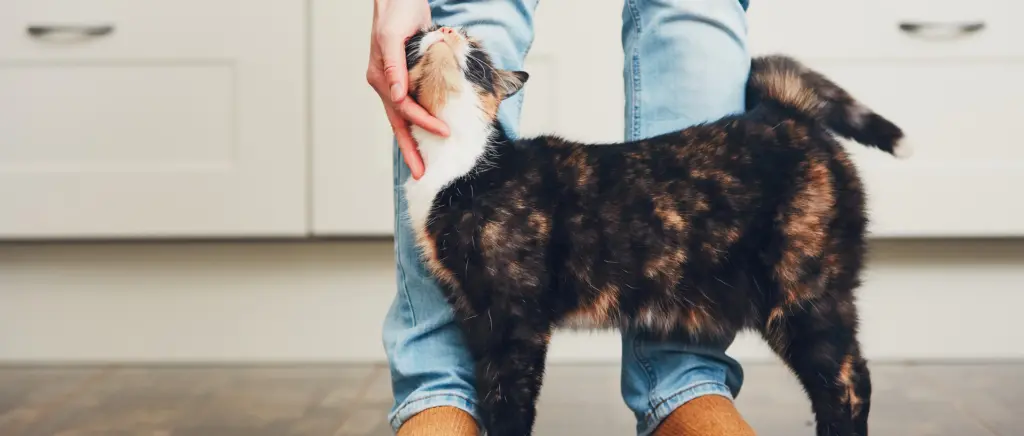A cat rubbing against your legs or bumping their head on your hand for pets is a pretty special feeling—even if they sometimes do it at inopportune times. But what exactly are they saying when they do it? Learn more about how cats use their bodies to send messages and gather information.
Marking Territory
Meows aren’t the only way cats communicate. Cats have scent-producing glands on their faces, front paws, torsos and tails that create special chemicals called pheromones. These pheromones allow them to transmit powerful messages to other felines in the vicinity. When they rub on posts, furniture or even other cats, they could be using their pheromones to say, “Here, I am. Let’s mate!” or “This is my territory. Back off!”
Talking with Head Bunting
It’s heartwarming when house cats brush their bodies against your legs or push their foreheads into you. This gesture, called “cat head bunting” or “headbutting,” usually means “pet me” or “give me attention.” Around mealtime, cats can really pull out the stops with this behavior. Cat bunting and rubbing is their way of showing they’re excited that food is on its way, or a not-so-subtle encouragement to “hurry it up!”
Checking You Out
Cats are very olfactory creatures, meaning they use their noses to gather information about their surroundings. Rubbing against you can be an easy way for them to check out your scent and the scents of other animals you’ve interacted with. But watch the cat’s body language as they rub against you before touching them, especially if the cat is not your own—while it seems like a friendly gesture, it doesn’t always mean they want to be petted.
Marking Their People & Friends
Kitties are usually showing affection when they hop into your lap and rub their faces against your hands while purring up a storm. But why do cats headbutt other animals or inanimate objects like furniture? Cats are territorial creatures, so rubbing their pheromones all over you, their other animal friends and their environment broadcasts to the world that all those things belong to them!
In homes where multiple cats can be competing for your attention and space, cat rubbing can increase and hissing turf wars can ensue. Keep the peace by spreading the love around and making sure each cat has his or her own separate feeding bowls, litterboxes and scratching posts.
What if My Cat Doesn’t Show This Affection?
Don’t take it personally! If you live with only one cat, the urge to rub and mark may not be as great as in multi-cat households. But cats’ behavior can change over time. As they age and mellow out, the desire to be soothed by your touch can increase. There may be an abundance of head bunts in your future!
Whether cats are simply marking you or their territory, head bunting and rubbing up against you is their way of communicating belonging. And that’s a beautiful thing! Make sure they feel the belonging too by filling their bowl with tasty nutrition you can trust.


